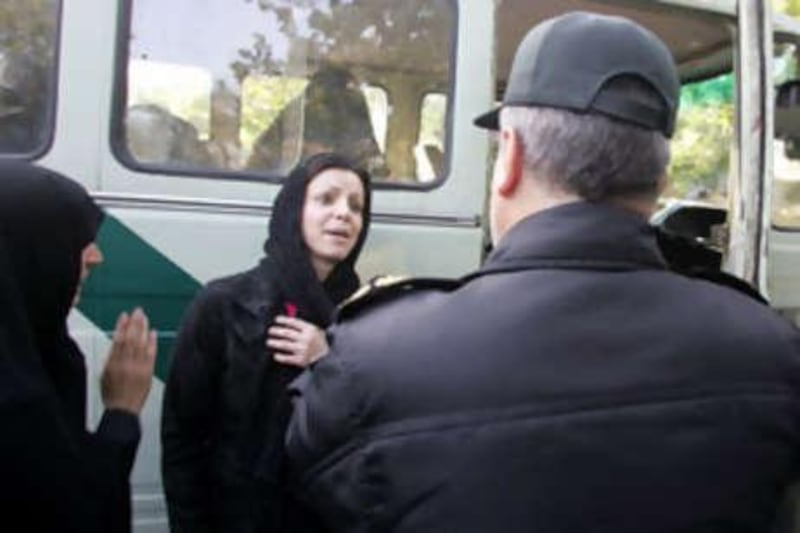TEHRAN // Iran's religious establishment is baffled by Mahmoud Ahmadinejad's criticism of recent actions of the morality police. Some see it as an attempt by the president to separate himself from hardliners and conservatives whose votes helped him to power. Police on the streets and in shopping centres, parks and other public places of Iran have not only targeted women and men whose appearance is not in accordance with prescribed dress codes but have also addressed other morality issues such as relations between unmarried couples.
Yet, in a live, televised interview on Sunday, on the anniversary of his disputed re-election, Mr Ahmadinejad alleged that the actions were a means "used by some to create tumult" and even threatened to seriously reprimand those responsible if they did not stop. "The government does not agree with such behaviour and will respond to and control it as much as it can." Some question, however, how he can shake off responsibility for the enforcement of moral and dress codes when the police force is directly under the control of the interior minister, who is appointed - and can be dismissed - by the president.
"It is an insult to ask a man and woman walking on the street about their relation to each other? nobody has the right to ask such questions," the president said. In recent weeks, Iranian women have been fined heavily for wearing make-up and nail polish or been forced to wash away make-up and change into "appropriate" clothes at airports before being allowed to board planes. "How can it be possible that they [the police] act against the president's wish? If it's not the government, then who is behind it?" asked a young woman who claimed she had been stopped several times on the streets recently for her appearance.
The declaration came as a shock to the hardline religious establishment, which considers guarding the morality of society as one of the principal duties of any Islamic government, let alone a government they helped to power and have thrown their weight behind during the past five years. "Encountering such organised inappropriateness [regarding dress and moral codes], on the contrary, is among the responsibilities of government bodies and declaring that [the government] isn't involved doesn't do away with responsibility," Kayhan, a hardline newspaper, wrote in an open letter to the president on Tuesday.
Mr Ahmadinejad's accusation that those who are leading the operation mean to create tumult was not taken lightly by the hardline government's influential supporters, either. Such an accusation is "humiliating" to those who are the standard-bearers of morality, one hardline cleric, Hojjatoleslam Ahmad Khatami, said in an interview with the ISNA news agency on Monday. He demanded that the president apologise and explicitly confirm his resolve to fight immorality.
Kayhan also alleged that the president has been receiving bad advice, "in contradiction to the foundations of his Islamic and revolutionary thinking" that could serve to cause a breach between the president and the religious establishment to the advantage of "seditionists", a euphemism for the opposition movement. The president's critics in the hardline conservative camp say the bad advice and influence comes from the president's highly trusted adviser, Esfandiar Rahim Mashaie, whose unorthodox religious views have several times given rise to fierce criticism of hardline clerics.
"He has a big influence on the president's thinking," said Ali Mottahari, a conservative legislator who is among the president's most notable economic critics, according to Khabaronline, a news portal. Referred to collectively as Principlists, the hardliners allege that the president's attack on enforcers of dress and morality codes is propaganda meant to portray himself as an opposition leader, win him supporters from among the ranks of the Green Movement or even to divert public attention from other urgent matters that make the government uneasy.
Mr Ahmadinejad has not reacted to all the charges but the official government newspaper, Iran, called the criticisms "unjust or motivated by self-interest". @Email:msinaiee@thenational.ae





